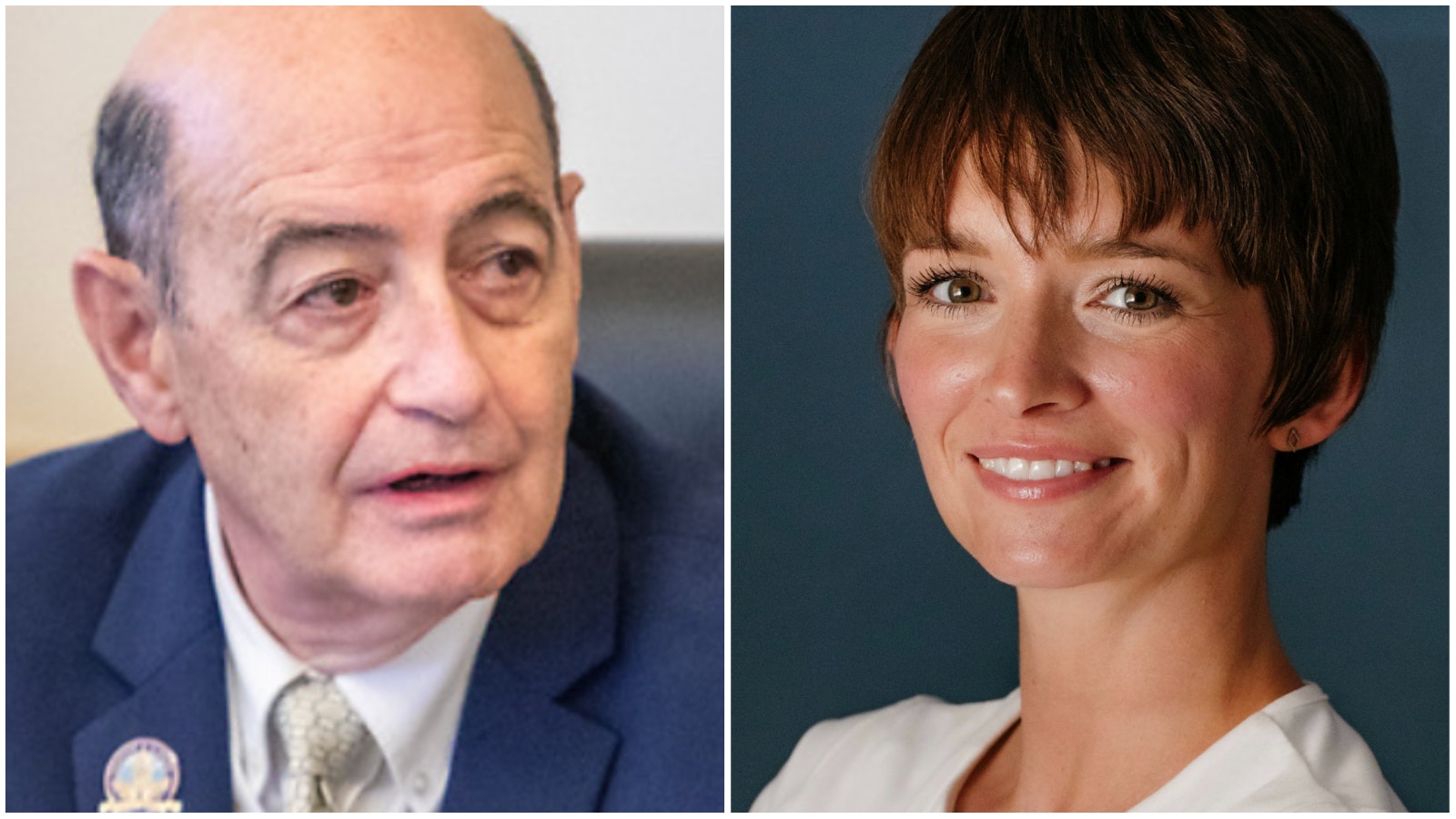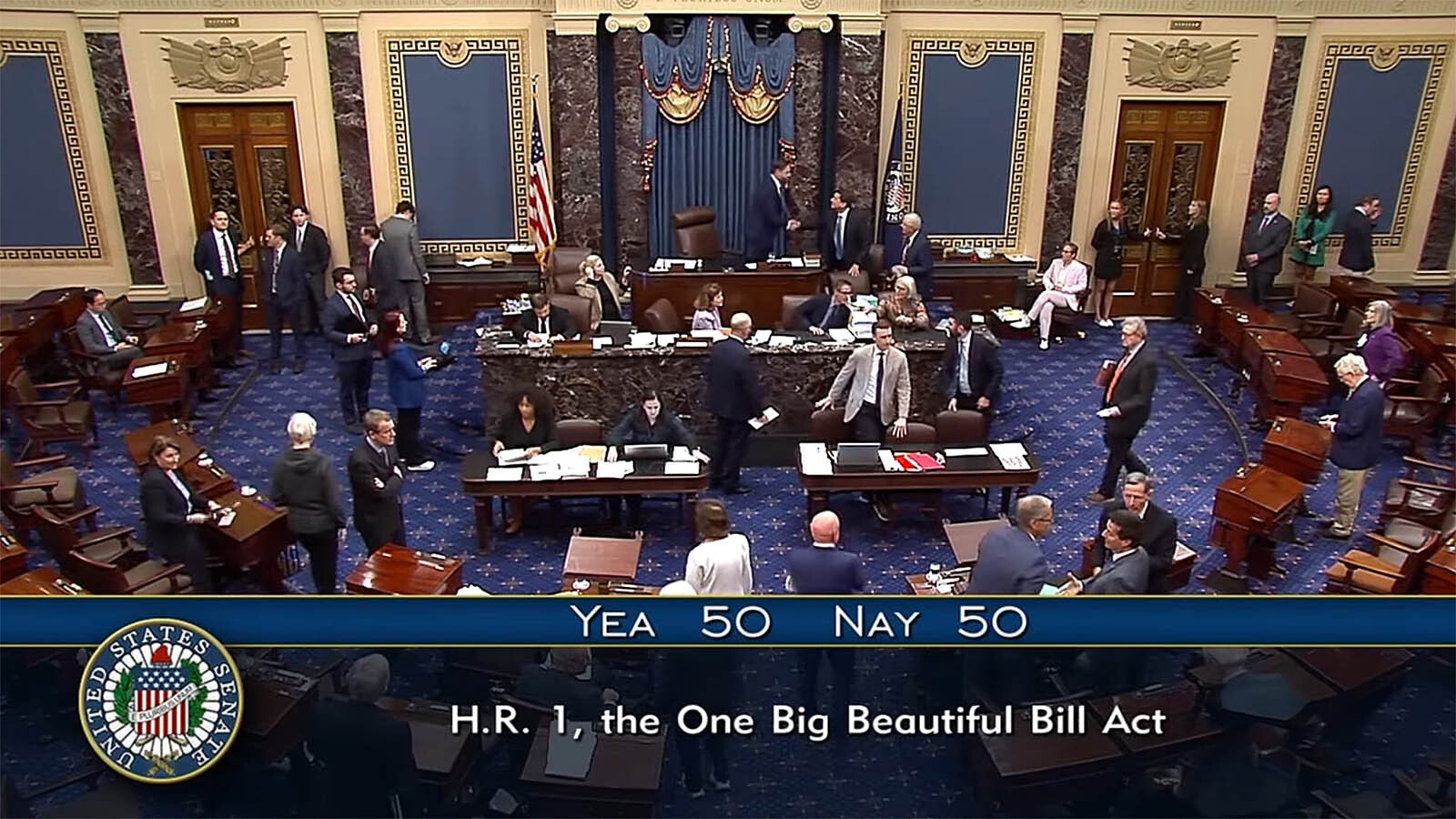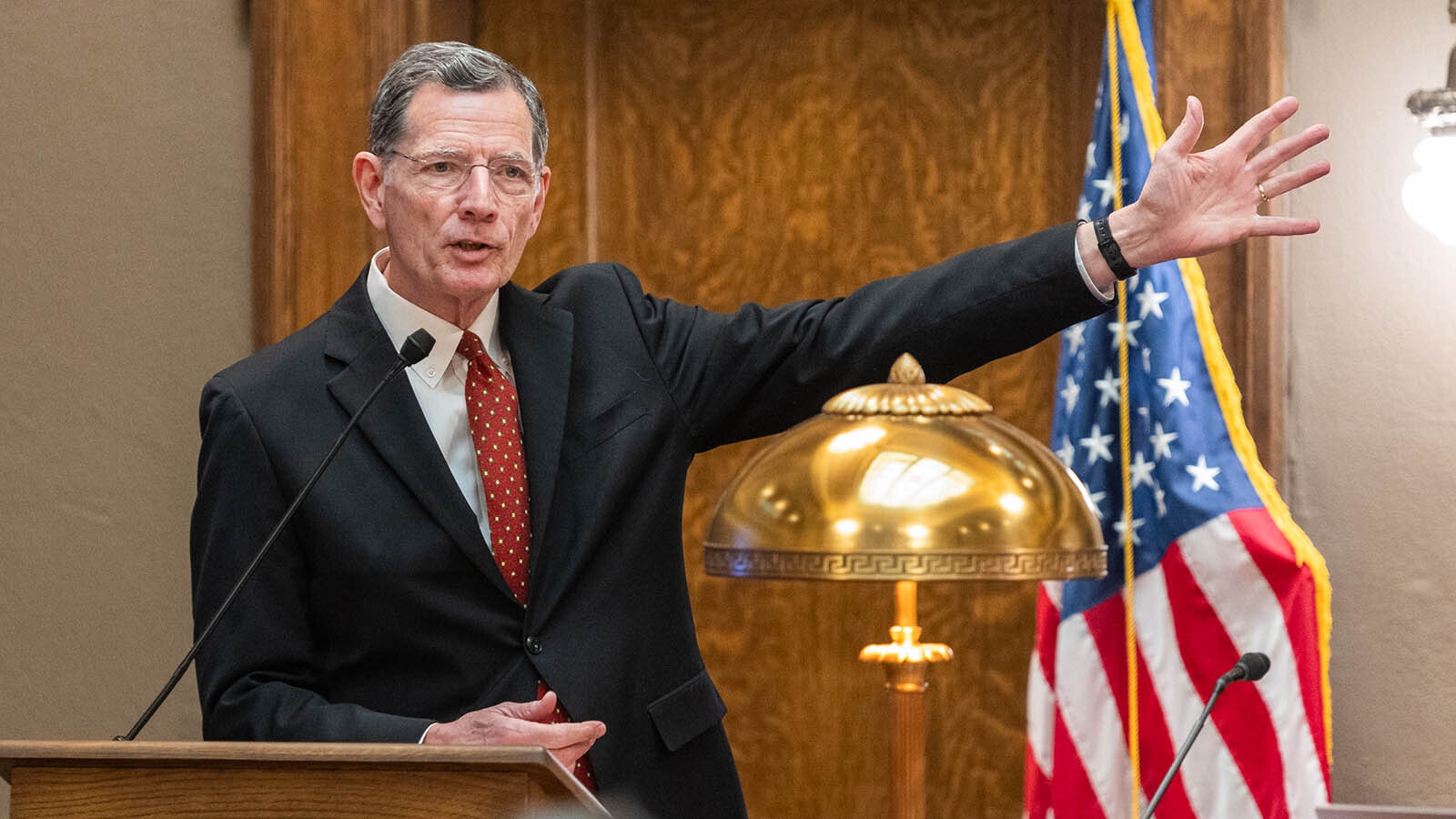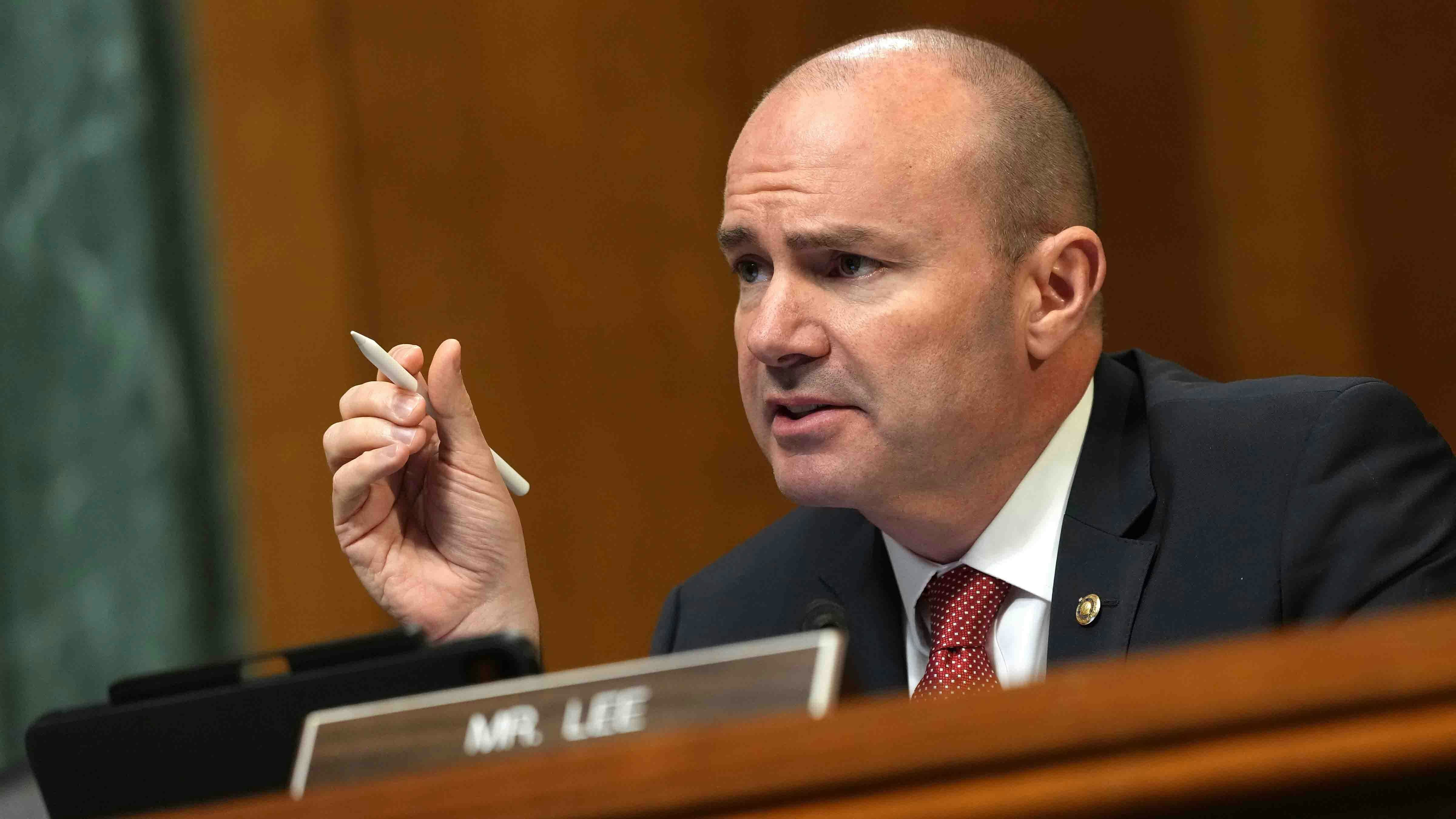By Leo Wolfson, State Political Reporter
Leo@cowboystatedaily.com
There isn’t much separation in the political stances of Democrat Marcie Kindred and Wyoming State Sen. Stephan Pappas, R-Cheyenne, but on abortion, their positions are miles apart.
There also is contention between the opponents about their availability to work in the Wyoming Legislature, with Kindred calling out Pappas as sexist for questioning the time she could spend as a lawmaker as she is still raising children and working full time.
Kindred is challenging Pappas, who is running for a third term to represent Senate District 7 in the Wyoming Legislature.
He supported Wyoming’s trigger law that went into effect this year, banning all abortions in the state except in cases where the mother’s life is at risk or when the pregnancy stemmed from a rape or incest. The law was triggered by the U.S. Supreme Court’s overturning the landmark 1973 Roe v. Wade decision.
“If you have a fairly healthy mother who wants an abortion for their convenience sake, to me that’s murder,” Pappas said.
Pappas said he finds abortion to be a state’s rights issue and opposes legislation crafted by U.S. Sen. Lindsay Graham, R-South Carolina, that would return the issue to being afederally guided mandate, unless a state has stricter laws.
Kindred is primarily pro-choice and says she sees abortion as a health care decision. She’s unhappy with the recent overturn of Roe v. Wade, but said she has confidence Wyoming will make the right decision on the controversial issue.
“You can choose to be against abortion, but you do not get to choose for anyone else,” Kindred said, adding she has seen a “whole spectrum of perspectives” on the issue, from family planning to pregnancy complications.
“Abortions save lives of countless women,” she said.
She also supports providing more resources and postnatal care to women so they don’t feel financially obligated to have abortions.
“We need to get the government out of our lives and out of the hands of people that make decisions for others on this – the lawmakers,” she said.
Double standard?
Pappas, who is retired, said he has extensive free time to devote to the Legislature and works every day for it. In the last three years, Pappas has sponsored six bills.
He questioned Kindred’s ability to devote enough time to the Legislature because she works full time and is raising children.
Kindred countered by saying a man with a similar background as hers would never be doubted the way Pappas says.
“It’s a blatantly sexist argument about my ability to legislate effectively,” she said. “I have a supportive office and team at work, an incredibly supportive husband, family and community. Men are not asked how they will ‘juggle it all.’ It’s an absurd argument.”
Kindred said simply being retired shouldn’t be seen as a job qualification and that more diversity is needed in the Legislature, which she believes is primarily filled with retired, affluent individuals. She wants more working-class people serving in this body.
“I love the idea of a citizen’s legislature,” she said. “We need to work hard for young, hard-working families to be able to participate.”
Kindred also pointed out that Pappas missed the last day of the last legislative session to attend a parade out of the country, and he often travels internationally. She said hisabsence led to a critical delay in the redistricting process because an initial draft failed to pass by one vote. She said this affected the final outcome of that work.
He also failed to attend the special session held on COVID-19 restrictions in late 2021.
“I know what it means to show up for Cheyenne,” Kindred said. “Not being present is not being in touch with your constituents.”
Experience
Pappas is chairman of the Select Committee on School Facilities and a member of the Senate Revenue and Highways, Transportation and Military Affairs committees.
A former architect, Pappas said his experience designing school facilities is integral to his work on the School Facilities Committee. Pappas designed the Marian H. Rochelle Gateway Center, University of Wyoming High Altitude Performance Center and a handful of school buildings in the Cheyenne area.
“My talents suit well for serving on the School Facilities (Committee),” he said.
Pappas also is a liaison to the State Building Commission and said that he’s “brought my know-how on many issues.”
Pappas served in the National Guard for 24 years. After retiring, he decided to run for the Legislature in 2014.
“It kind of made sense to me,” he said. “I’ve always wanted to give back to the state and country.”
In this year’s primary, he faced opponents for the first time since 2014, but still won his race by a healthy margin.
Kindred is a real estate agent and mother of four. After a relatively quiet, unopposed primary, she has stepped up her campaign efforts for the general election putting up a significant number of yard signs and a large billboard in a main Cheyenne corridor.
Kindred ran for House District 8 in 2020, losing to Rep. Bob Nicholas by 6% of the vote.
“There are things just not being done,” Kindred said of her desire to run again. “I just felt unrepresented and unheard.”
Kindred said she wants to make Wyoming a place her children will want to live after they graduate from high school. She sees the people of SD 7 possessing a “strong, considerate voice of reason” and overall moderate views.
Spending
Pappas said he supports limited government, but also wants the government fully funded. A member of the Revenue Committee for the last two years, Pappas said he is well-versed with the state’s budget and wrote a scholarly paper about it.
Pappas said Wyoming needs to improve its road infrastructure and finds the Cowboy Statehighways “woefully behind” other states. He said new funding mechanisms will be needed for these corridors, heavily dependent on the gas tax for revenue. As electric cars become more prevalent, there will be less revenue produced through this source.
Pappas is a fervent supporter of Medicaid expansion and the state’s mental health services. Unlike many other Republican legislators, he isn’t opposed to accepting federal money, expressing disgust that the state has turned away what he said amounts to about $1 billion in federal grants.
“I don’t understand why we can’t accept federal dollars,” he said. “I’m not afraid to tell people what I believe. Why are we turning these dollars away? It doesn’t make sense.”
Kindred, who also works for Healthy Wyoming, also supports Medicaid expansion and a recent draft bill being considered in the Legislature to expand Medicaid for postpartum care.
“It’s a Band-Aid, I’m 100% in favor of (it),” she said. “It’s a way to expand Medicaid as a whole. Let’s get that one and expand.”
She said she sees expanding Medicaid as a way to better recognize Wyoming’s voices.
Pappas said providing better health care in Wyoming will attract more insurance providers and a larger, more-educated workforce. He said the state has done a poor job attracting businesses to the state.
“If you don’t like new taxes, then add taxpayers,” he said.
Pappas said the state needs to develop a better funding model and supports an “all-of-the-above” energy policy. He describes himself as “very pro fossil fuel” but also wants the state to pursue and support alternate sources of energy like wind, carbon capture and carbon-sourced building beams.
Pappas also supports the Natrium nuclear power plant that will be built in Kemmerer and harnessing geothermal energy, mentioning how Nevada has 17 geothermal the plants while Wyoming has none.
“We have such good geothermal assets in Wyoming,” Pappas said. “It’s very clean. Why we don’t do that I don’t know. We have abandoned wells everywhere.”
Kindred has a similar energy stance. She has experience with the issue firsthand as she has a family member who recently lost a job at the Sinclair refinery.
Kindred said she would like to continue supporting traditional fossil fuels while investing in new alternative energy opportunities. She does not see a bright future for fossil fuels in the long-term picture.
“I’m not going to do anything that damages hard-working families,” she said. “I want to focus on them. How do we prepare them for investing more in the future? We’re not doing them any favors without having honest conversations about our energy future.”
Education
Pappas, a former member of the Education Committee, describes himself as pro-education and said all schools in Wyoming need to be properly funded.
All of Kindred’s children are enrolled in Wyoming schools and said this connection gives her insight into the value of public education in the state.
Her two oldest boys went to a one-room schoolhouse from kindergarten through sixth grade.
“They got the same education in-town kids get,” she said. “That’s the promise of education in Wyoming.”
Kindred is concerned that by cutting funding for educational programs like the arts and sports, it will lead to more school dropouts.
“Education is only as good as the extracurricular activities being offered,” she said. “There should always be reasons to make sure money is spent wisely, but you’re going to have to continue to fund this.”
Pappas said too much attention is given to critical race theory, and he doesn’t believe it’s being taught in Wyoming’s schools. Although Pappas said there is “much bigger fish to fry,” he also said people should keep an eye out for this type of curriculum.
“It’s something we need to be concerned about,” he said.
Kindred said critical race theory, which she describes as a graduate school-level area of study, is being used as a flashpoint to divide Americans and is not concerned with its presence in schools. She said she supports local control and leaving it up to teachers to decide what is taught to their students.
“It’s not the job of lawmakers to mettle with schools and their curriculum,” she said.





